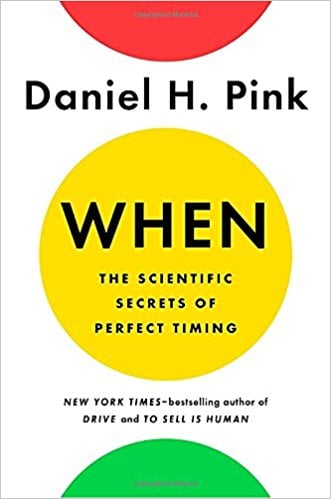You have /5 articles left.
Sign up for a free account or log in.
 When: The Scientific Secrets of Perfect Timing by Daniel H. Pink
When: The Scientific Secrets of Perfect Timing by Daniel H. Pink
Published in January of 2018.
Daniel Pink is a brand.
Those who will read When will most likely have read Drive, To Sell is Human, A Whole New Mind, and Free Agent Nation.
When is all about timing. Pink delves into the research about when we should be doing things, leaving aside the why and the how.
As with every Pink book, the advice given is based on solid academic research. Ignore at your peril.
But can we really apply the lessons in When?
One example is e-mail. Pink recommends that, based on the research, if we want to create the impression of a proactive and effective colleague that we should answer e-mail quickly. This quick e-mail response recommendation, however, goes against other research that we should be carving out uninterrupted time for deep work.
We can’t have it both ways. Either we turn off the e-mail to focus on thinking and writing and creating. Or we leave the e-mail on, and respond quickly.
Another conundrum is how we should structure our academic days. Pink points out that the research shows that we are most effective in the morning, we dip in the afternoon, and then rebound at night. This research tells me that we should reserve our mornings for focused work. For research and writing.
The problem then becomes what we should do in the afternoon? Should we move all of our meetings to the afternoon, when folks are likely to be sluggish and ill-tempered.
Pink covers the research how we would never want to get operated on or be subject to a judge’s decision in the afternoon. What about working with colleagues?
Teaching offers another timing challenge. The professor and the student may have a very different chronotype. The educator may be at her peak abilities first thing in the day, just when the traditionally aged 18-22 year old learner’s brain has not yet woken up.
Reading When made me think that one of the great under-appreciated benefits of online learning is that it is not time-bound. Everyone in the class can engage with the material when they feel most able to absorb, reflect, and create.
After reading When, I’ve become much more aggressive in scheduling important conversations early in the day. Afternoons seem like a good time to schedule walking meetings.
I’m still torn on how much to prioritize quick responses to e-mail.
Are you also a Daniel Pink fan?
What are you reading?




